As the Bharatiya Janata Party’s domestic and foreign policies take a hard turn to the extreme Right, and as protests spring up across India, it’s important to understand how much popular support it has on these moves. The overall mandate for the BJP was clear in the outcome of the 2019 Lok Sabha election, as was the likelihood that it would follow through on all its hardline promises – be it scrapping Jammu and Kashmir’s special status, paving the way for the Ram Mandir or identifying ‘infiltrators’. But does the average Indian directly support these policies?
In other words, does the average Indian have an authoritarian streak?
In the states most affected by these decisions and where protests have been the most widespread, the consensus has been clear for some time now. In the post-poll survey conducted in the northeast states by the Lokniti-CSDS (Centre for the Study of Developing Societies), the majority of respondents who had heard of the Citizenship Amendment Bill (CAB) at the time of the 2019 election already opposed it.
Similarly, in Jammu and Kashmir, a majority of the residents were equally clear about their views on Article 370 and the presence of the Army under the Armed Forces Special Powers Act (AFSPA). And yet, these known views did not affect the BJP’s decision to move ahead with the dilution of Article 370 and the reorganisation of the erstwhile state, where civil liberties remain curtailed for the fifth straight month.
Also read: Legal autocrats are on the rise. They use constitution and democracy to destroy both
The popular, national view
But it’s likely that these views are not shared nationally. When the question about support for the CAB was asked pan-India by Lokniti-CSDS before the election, a majority of respondents had not heard of the bill; but among those who had, slightly more supported (35 per cent) than opposed (33 per cent) it. (More recent national polling on the CAB, now a legislation, has not been conducted.)
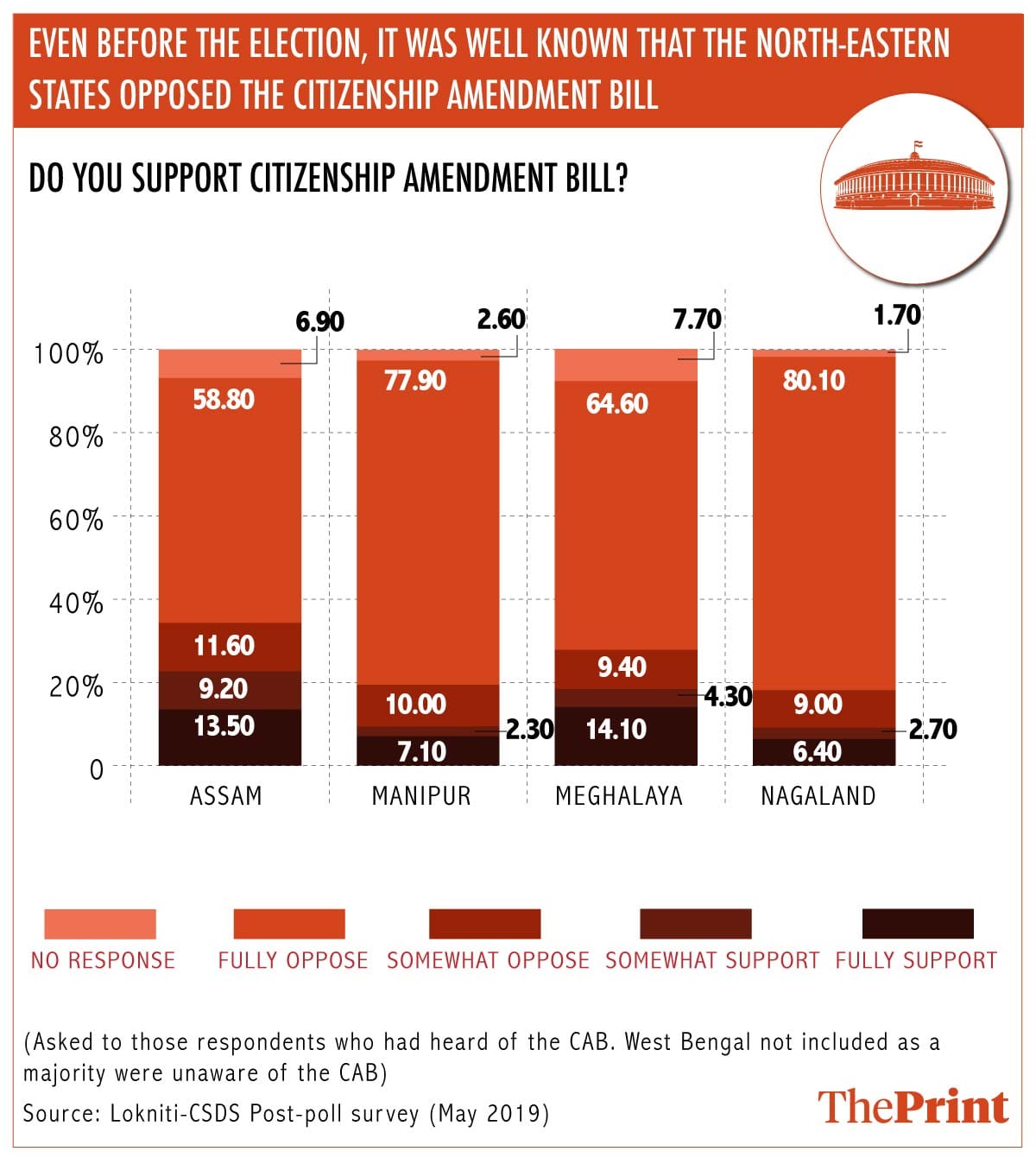
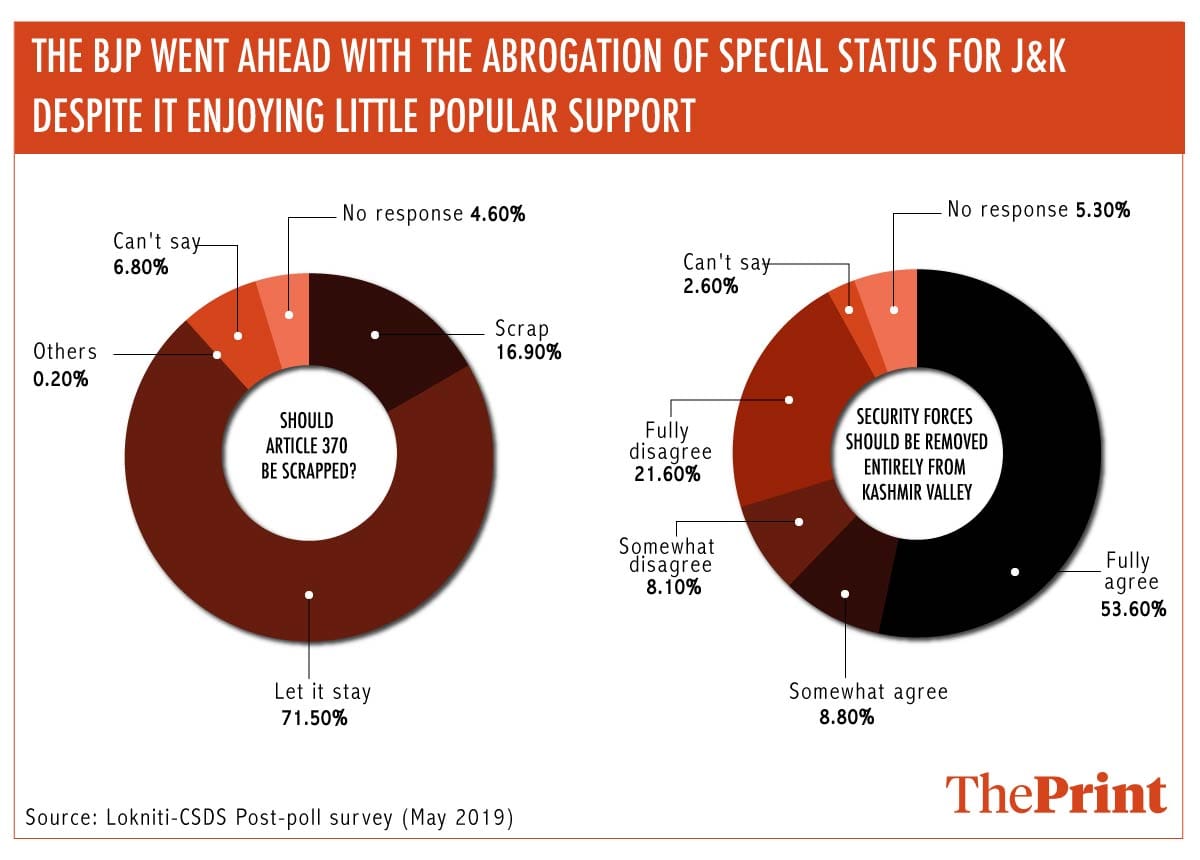
More broadly, Indians have demonstrated both majoritarian and authoritarian impulses for some years now. In a 2019 Azim Premji University-Lokniti-CSDS national survey, more than one-third of Hindu respondents considered Muslims to be unpatriotic (although Muslim respondents did not feel the same way about themselves). More Hindus supported the punishment of people who do not say “Bharat Mata Ki Jai” than those who were opposed to it, and a majority of Hindus supported punishing those who do not stand up for the national anthem. A majority among both Muslims and Hindus supported action against religious conversion.
Younger people do not have particularly more progressive beliefs. In their 2017 study on the attitudes of young people, the CSDS and the Konrad Adenauer Stiftung found that six out of ten respondents supported banning movies that hurt religious sentiments, even more so among Muslim youth; 70 per cent of Hindu youth were opposed to allowing anyone to eat beef; and one-third of young people opposed inter-caste marriage.
Also read: BJP’s ambitious political push shows seriously misplaced priority when economy’s in crisis
Like for authoritarianism
For nearly 40 years, the World Values Survey, a conglomerate of various country-level polling agencies, has surveyed sample populations around the world on their views on various social values. In the latest round (2010-2014), the Indian sample demonstrated a lower commitment to democratic principles than most other major countries.
India, along with Pakistan and Russia, featured below the global average on the importance accorded to democracy. Indian respondents also had lower regard than Pakistani respondents for civil rights and for the belief that these safeguards against oppression were an essential part of a democracy. More Indian respondents supported being ruled by a “strong leader” and the army than those in most other countries – in fact, Indian support was higher than the global average.
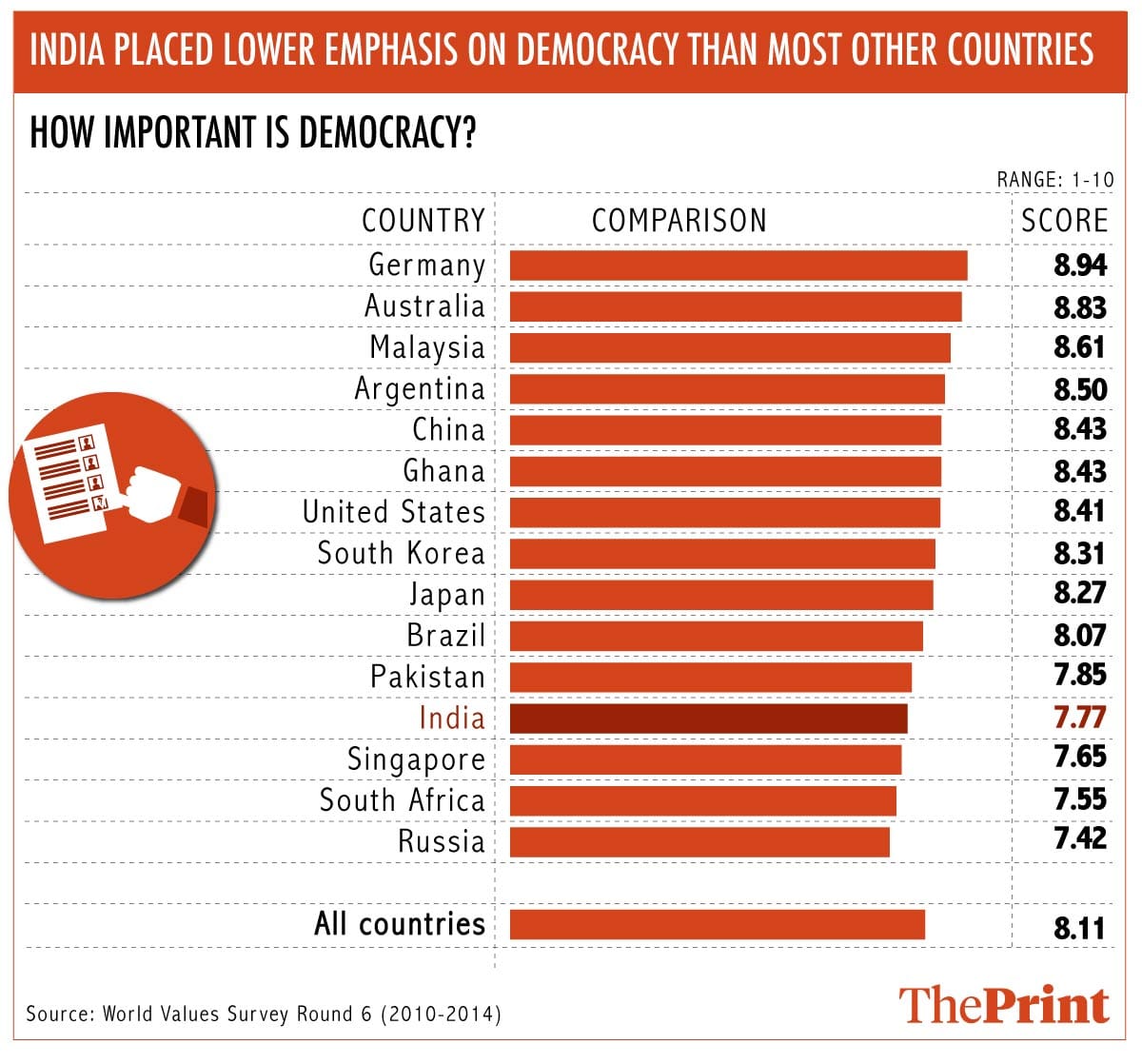
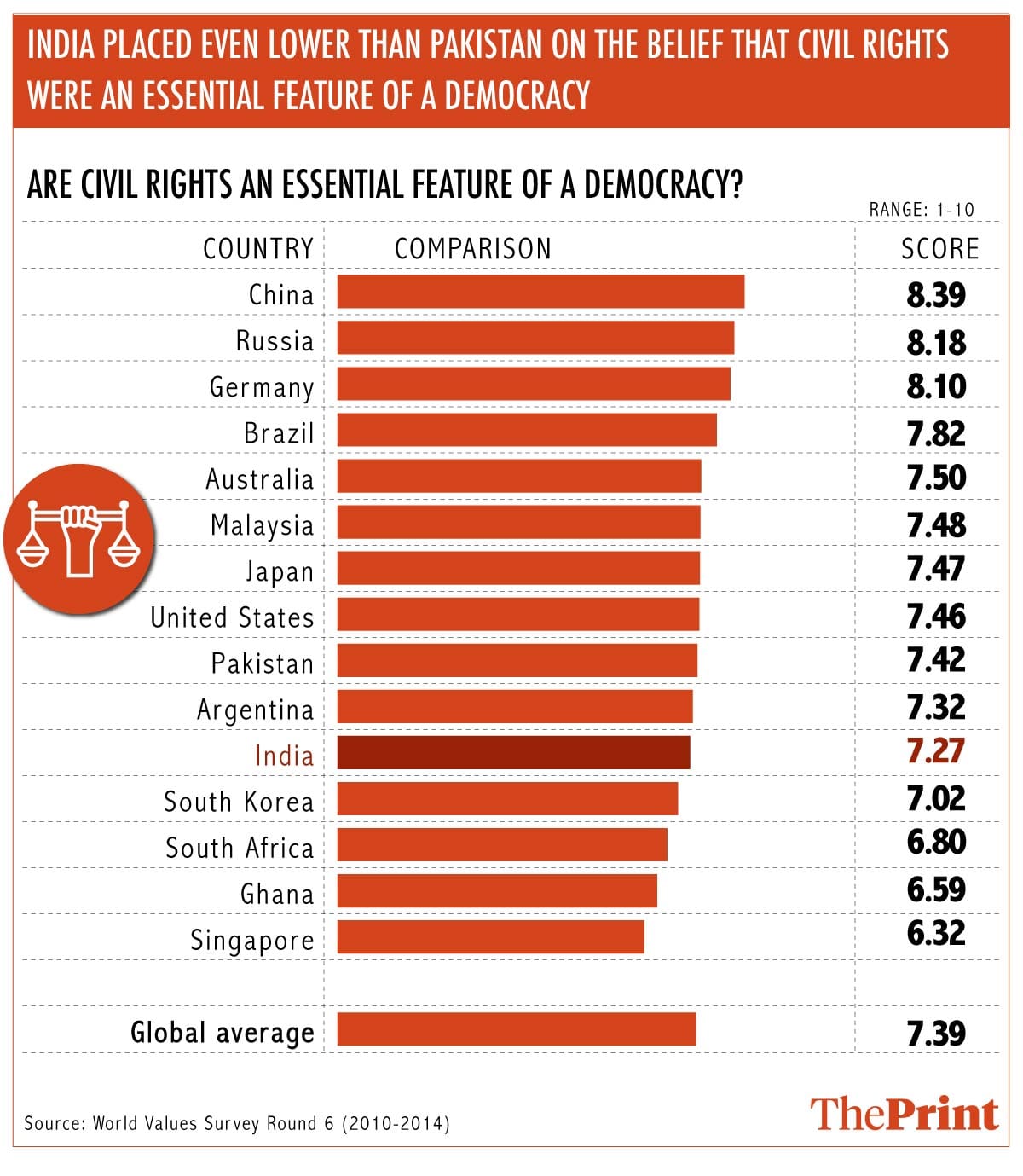
Will the combination of the BJP’s Rightward moves post-2019 election win create some discomfort among a group that has otherwise shown support for authoritarianism and majoritarianism? Among BJP supporters, who have already revealed their support for “core Hindutva” issues, opposition is unlikely, or it could be localised. There are, however, strong state-level divisions. In the Azim Premji University-CSDS study, for instance, the southern states demonstrated much greater commitment to the freedom of expression.
But in India overall, people’s comfort level with the BJP’s extreme Right policies is still unclear. The latest Pew Global Attitudes Survey, conducted in the spring of 2018, found that a majority of Indians were satisfied with the way democracy was working. Their main complaint? The economy.
The author is a Chennai-based data journalist. Views are personal.



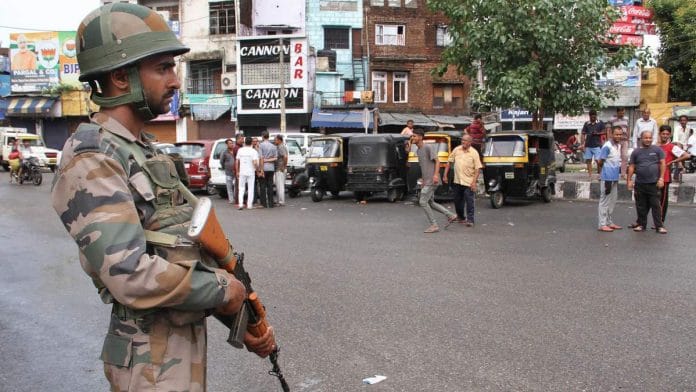



When it comes to running down India, none can beat the Indian Journalists. What we have now is Mobocracy, as Nani Palkhiwala put it. Democracy is not really the rule by the people. It is the rule by the chosen minority, who can persuade the majority of the people to follow them. Tell us if there any democracy which is working differently. In fact, the freedom of expression and freedom of association available in India is so much that it is bordering on anarchy these days. What does this writer think of China? Not authoritarian?
Why only Hindus (I mean all Indians except Muslims) have to obey all the laws of land. Do the muslims have only rights and no duty to live in peace with others. I think there is no Muslim in the world, who thinks the country he is living as his motherland. For them Mecca come first and country afterwards. It is no secret that the Muslims of India are more sympathetic towards Pakistan than India.
Tom and Dick follow no survey. They will do what they know and what they want-if the guru in Nagpur agrees.
Correction: If Harry agrees or as directed by Harry.
If you want to be truly representative of the citizenry of India, then you’ve fallen short by a mile in your sample data.
All you needed to do, if you were interested in gauging the authenticity of the opinions you collected as data, was to include a set of questions to find out the background of the students polled.
It is a well known fact that certain backgrounds are breeding grounds for certain ideology. Without these backgrounds, your data may, and is most likely to be echos in the same chamber.
Sad to see this sort of reporting and analysis.
Too funny. China is on top. Comrades your dictatorship of the proletariat is so democratic. India should emulate — but oh, we have lurched to the right, know?
Singapore results above shows why democracy is not required for development.
Lol casteism helps only your congi party to divide majority community.
Another gem from a deranged Marxist mind. Seriously, are we really paying salaries to the garbage minds in our social studies departments at JNU and other such places to produce trash like this author? Is this what we have fallen to?
I feel you eat shit to groom your brain and your thought process…
That’d be you Muslims.
See what the deranged Corbyn did for Labour party, the most crushing defeat in almost a century. All thanks to the weirdo Leftist ideas of Corbyn and gang.
Hilarious how the Leftists immediately next day after the crushing defeat went on a march in London refusing to accept the the results!! Like in USA after Trump victory. So much for Leftists believing in democracy!
When the supposedly liberal political parties misuse democracy cynically & to fill their own coffers, people start losing confidence in it. This lack of credibility is what is reflecting. That Bangladeshis had poured into West Bengal and settled in other parts of the country is now an open secret accepted by many workers of ex-Communist workers. When you start taking people for granted, they start turning their backs on you. We saw this in the recent British polls as well. Leftist ideals and liberal sycophants are losing favour rapidly across the globe.
Difficult for one citizen to judge the national mood and temper. However, if there is an erosion of liberal impulses in our public life, it may not necessarily mean that most of us like or support authoritarianism. Again, students on university campuses may not be 100% representative – although we should certainly wish that all Indians get a decent college education- but they show no great love for the helmeted, booted folk violating the sanctity of their campuses. We should not rationalise what is wrong. It will end badly.
China and Russia are No. 1 & 2 on support for civil rights? Thanks for the laugh.
I had a hearty laugh too after long hard day.
The opinions are expressed by the people, and not by the autocratic governments of Russia and China. The people of Russia and China appreciate the value of civil rights because they don’t have many of them.
You can’t even opine about those things in China. That is how paranoid the Commies are. These surveys are a farce created out of thin air by jobless Marxists in JNUs across the country.
A worldwide survey was conducted by the UN. The only question asked was: “Would you please give your honest opinion about solutions to the food shortage in the rest of the world?” The survey was a huge failure. In Africa they didn’t know what “food” meant. In Eastern Europe they didn’t know what “honest” meant. In Western Europe they didn’t know what “shortage” meant. In China they didn’t know what “opinion” meant. In the Middle East they didn’t know what “solution” meant. In South America they didn’t know what “please” meant. And in the USA they didn’t know what “the rest of the world” meant.
After Kashmir Pandit forced exodus, there is no meaning to appeasement minority & delegation
Casteism and democracy is inimical to each other.
Are